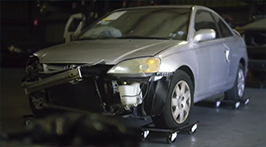VLOG: What to do if You Receive a Recall Notice and the Dealer Can’t Fix Your Car
For the 3rd year in a row automakers have recalled a record number of vehicles for a myriad of safety issues. The Wall Street Journal reports, 51.26 million vehicles were recalled in 2015, an uptick from the 50.99 million officially recalled in 2014.
Manufacturers are required to notify you of any vehicle recalls. If you suspect your vehicle may be included in a safety recall but have not yet received the notice, contact the manufacturer directly or visit NHTSA’s site, safercar.gov and input your vehicle identification number (VIN). The VIN can be located on the driver’s side of the dashboard in front of the steering wheel or on the driver’s side doorjamb.
Once you have confirmed your vehicle is part of an open recall, determine if you’re eligible for free repairs. If the car is less than 10 years old from the date of the first purchase, the automaker must correct the problem by repairing the car, replacing the car or providing a refund for the purchase price of the car minus depreciation, according to NHTSA. If your car is more than 10 years old, you may have to pay for repairs out of pocket. If you have already paid for repairs to correct a defect that’s since been the subject of a recall, you may be eligible for reimbursement. However, you have to act quickly: Eligibility for reimbursement is determined within 10 days of the manufacturer mailing out the last recall notice.
Once a recall has been issued, the law gives an automaker a grace period to implement a plan of action. In this case, there is nothing to do but wait for further instructions. Typically, your local dealership will make the necessary repairs at no charge, regardless of where you originally bought the car. However, dealers aren’t required to make any repairs before the official date is issued by the manufacturer.
If you are having difficulty getting your car repaired or repaired without charge, you should first contact the dealer service manager and provide a copy of your recall notification letter. If that doesn’t work, try contacting the manufacturer. If all else fails, file a complaint with NHTSA by phone, mail or online.
Furthermore, if the dealer does not have enough replacement parts and cannot fix your vehicle for weeks or months, the consumer should be proactive: call another repair facility. Contact independent auto mechanic shops in your area; they may be able to find replacement parts sometimes through channels that either aren’t accessible to the dealers, or because the dealers are so overwhelmed, sometimes the smaller shops can get to you sooner and to fix your car without forcing you to wait weeks or months. If those options are not available to you, ask your dealer for a rental or loaner car; oftentimes they will provide one to you at no charge. Alternatively, sometimes they’ll bump you to the front of the line because they don’t want to spend the money on the rental car.
So again, first and foremost, try to go to another repair facility and second ask the dealer for a rental car. Between those two things, you can get your vehicle addressed; you can have the problem fixed before having to wait months until the dealer can get to you when they have enough replacement parts.
Approximately 33,000 tire-related crashes occur each and every year, resulting in about...
The Ford C-Max Energi Electric car is being blamed for starting more...
“The findings in this analysis conducted for The Safety Institute are disturbing,...
